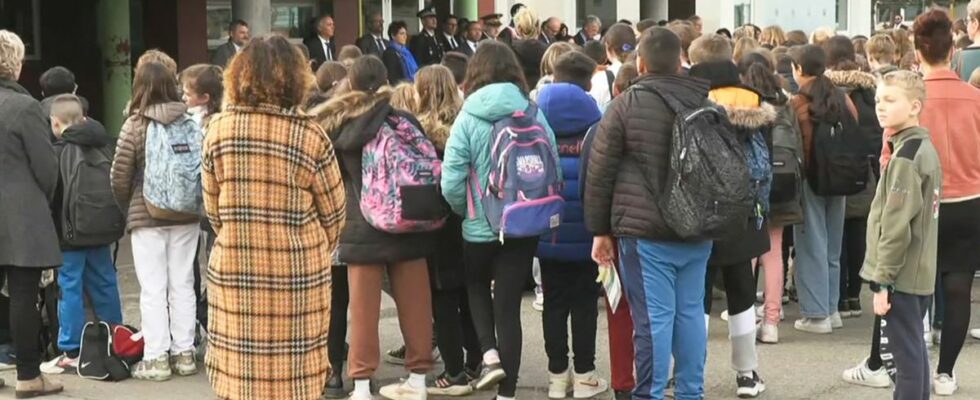A chilling murder scene, live. An entire second class witnessed the murder of its Spanish teacher, fatally stabbed by a classmate in the middle of class, last Wednesday in the Saint-Thomas-d’Aquin high school, in Saint-Jean-de-Luz. An episode necessarily extremely shocking for all these teenagers from 15 to 16 years old, but to which they will not react in the same way. Professor Manuel Bouvard, head of the child psychiatry center of Charles Perrens hospital in Bordeauxanswers questions from 20 minutes on the consequences of this event on these young people.
Can we say that the scene is all the more traumatic for these teenagers as the events occurred in a place that is supposed to be secure, and that the victim is a person representing authority (educational in this case)?
First of all, we must specify that at school, we are not in a universe where everyone is nice, it is not the crèche. Teenagers rub shoulders with school violence, they are no strangers to it. We know that cyberbullying affects a quarter of college students, for example. The fact that it’s about a teacher, a rather well-respected figure, and in this case one that looked benevolent and appreciated, is like a statue that’s taken down. This reinforces the impression of amazement, unreality and also that of insecurity, we can say to ourselves: “if we could do that to a teacher, we can do that to anyone? »
How can these teenagers who have witnessed this great violence react?
Faced with this type of situation, there are individual reactions but everyone will share amazement and disbelief. Whether for adults or teenagers, there is first an inability to think about what happened.
A few minutes, a few hours or even a few days after the events, depending on the person, the subject can behave very remotely from the event he has experienced. But there is always a lag time, under the effect of the brutality of the trauma, after which the emotions that have been blocked will reappear.
What symptoms should particularly alert adults who are close to these adolescents?
All these young people must be subject to very regular supervision. One can observe non-specific symptoms such as sleep disturbances, social withdrawal, or refusal of activities that they liked.
We must intervene when we feel that irritability, sadness, tantrums, sleep disorders and/or falling asleep are setting in. In the most severe forms, the subject can be invaded by images, ie the scene reappears in a brutal way, and it is often associated with a procession of very important anxieties. There may also be anxious refusal of school, and nightmares. But not everyone will develop these symptoms.
Should we necessarily insist that these children verbalize what they have experienced?
It is essential that professionals intervene quickly enough for these post-traumatic stress states and this is the role of the medico-psychological emergency units. They make themselves available to people, to help them verbalize. But beware, this is not an interrogation, but a space to talk about experiences and emotions in order to avoid emotional repression.
For a while, we were too intrusive and that can be harmful. We know that about half of teenagers will find it very difficult to talk about it. We must provide them with a warm and welcoming listening space, but for those who already have anxiety problems and who are the most fragile, we will have to take it slowly. Especially since it is a generation (11-16 year olds) that has been weakened by the Covid and social isolation. We have seen many young people arrive in a state of emotional distress.
How can we help them through this period?
Some will not be well and will need specialist post-traumatic stress care. They will need to see a specialist or perhaps first a general practitioner, sometimes perceived as less “stigmatising”. In the most severe forms, this may require hospitalization if it generates threats to themselves, suicidal ideation.
The accompaniment must be specific to each of the young people. Some will fix themselves without having to talk a lot about it, you have to respect that. But respect shouldn’t be indifference, you have to be supportive and you shouldn’t miss a young person who wants to talk about that. We must exchange, reassuring by talking about the event, the deceased person but also the author. There is a need to move towards an understanding, this act being so incomprehensible.
Do they need to talk about it among themselves?
Group work is particularly important for teenagers, because they will talk more easily with their peers, but you also have to respect everyone’s approach. You shouldn’t force it because those for whom it’s the most difficult to talk in a group are often the ones who are doing the worst. And, beyond talking between teenagers, you also need adult talking to explain things, for example that it’s dramatic but extremely rare.
Those who did not directly witness the scene but who are in the other classes of establishment must also be the subject of a certain vigilance because they have been exposed to this violence in a certain way.

